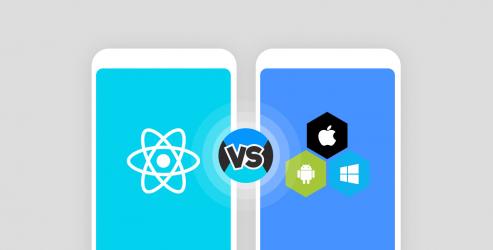
The fast revolving tech world has a lot to offer when it comes to mobile app development. And, very often the app developers get perplexed while making choice between Android and iOS, which platforms, frameworks or tools to choose. Both Android and iOS has its own advantages and hold a strong competition, likewise native and React Native is a strong competitor.
The key selection that requires precise determination over the platform - react Native or Native App Development.
Let's Have A Look On The General Definition:
React Native:
Introduced by Facebook, this framework offers smooth and easy cross-platform development. In general, it means no separate app development is required for iOS and Android. Only one codebase is required to develop aesthetically designed apps for both platforms. The top benefit of React Native is, it requires UI and UX.
Native Application:
And as far React Native is considered - It is an open-source JavaScript framework. The Native Application is created for a specific platform and the app developer has to make use of particular tools for app development. For instance; when it comes to android app development, coding is done using Java or Kotlin and Android Studio is the IDE (Integrated Development Environment)
Likewise, for iOS App Developers, object-C or Swift for coding purpose and Xcode is the IDE.
Thus, going through the above statements, it's clear that a different environment and IDE is required for both the Operating System.
Advantage of Using React Native:
Easy to learn and Implement:
React Native app development used JavaScript framework, hence, developers can transit from web application development to mobile application development.
Suits Hybrid and Cross-platform Development:
React Native do not require any platform-specific rules and feature.
Eventually, they have to apply only minor native improvement that includes deep linking, push notifications, and UI components.
Save Time and Money:
No need to hire two separate teams and build both applications from scratch, and ultimately your expense will get reduced.
Reloading:
Unlike native environment, with React Native, the developers don't need to spend time on compilation and upload, it directly deploys all the changes and displays them on the testing device, i.e. developers can view errors in the real time.
Use of component:
When developers are designing a moderately complicated mobile app, it requires the implementation of reusable components, possible to React Native only.
Frequent Update:
React Native is an open-source framework, and are prone to frequent update pertaining to the changing technology, offering improvements.
Further, developers can try to find ready-made 3rd-party solutions as many components are distributed within the group very often.
Disadvantages:
➤ Lack of Native Element
The developers cannot use the native elements of the device like Camera or Voice Recorder etc, this is one of the major limitations of this framework.
➤ Limited to Third Party Libraries And Native APIs
One of the disadvantages of React Native is, it does not support some APIs or third-party libraries if your application needs to integrate certain functionality.
![]()
Advantages of Native application
➤ Support Heavy Application Development:
In case you are looking to develop an application that is heavily loaded with technology-intensive components, it becomes necessary to implement advanced features for better performance. Here the applications need to create using native tools)
➤ Support APIs and Third Party Integration:
Sometimes, you plan to use multiple APIs and third-party libraries, then integration in native environments, so opting Native application is a better option.
➤ Robust Language:
Swift and Kotlin are robust and stable language, making development transparent by showing errors in code. This stability and robustness lack in React native.
Disadvantages of Native Application:
➤ Lengthy Downloading Process
➤ No Flexibility
➤ Time-Consuming Development
➤ Native Apps Require Frequent Upgrades
➤ Expensive Development
![]()
Reasons why to Go with React Native application Development in business?
From a couple of years, big brands worldwide have started adopting React Native for the application development. In the years to come, it would attract too many giant companies with the updates in features.
➤ App delivery is fast
➤ No need for hiring a separate development team
➤ Less time on regression tests
➤ The bugs can be solved quickly
➤ Less development Cost
Conclusion:
Nowadays, with the growing popularity of React Native potential, many businesses are racing towards this development framework to take advantage.
However, Both React Native and Native application have its own advantages and disadvantages. For instance, reactive native is an ideal choice to develop apps that are similar to Facebook or Instagram, whereas when it's about implementing advanced technologies like Blockchain, IoT, AR/VR, then the native application is best to prefer.










